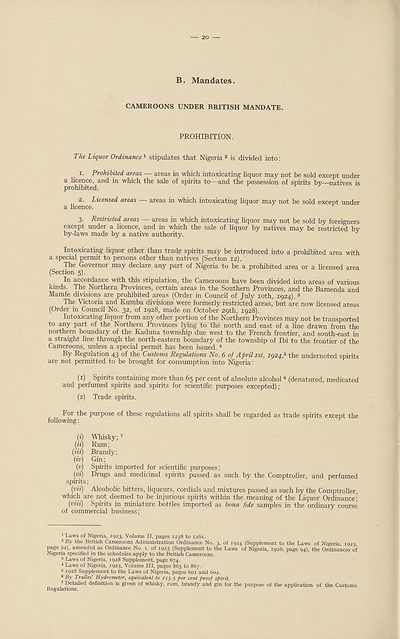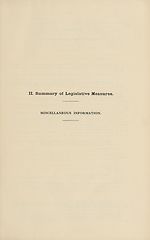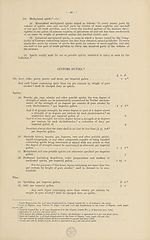Permanent Mandates Commission > Mandates : liquor traffic in territories under B and C mandates : statistics, summary of legislative measures and miscellaneous information
(20)
Download files
Complete book:
Individual page:
Thumbnail gallery: Grid view | List view

20
B. Mandates.
CAMEROONS UNDER BRITISH MANDATE.
PROHIBITION.
The Liquor Ordinance 1 stipulates that Nigeria 1 2 is divided into :
1. Prohibited areas — areas in which intoxicating liquor may not be sold except under
a licence, and in which the sale of spirits to—and the possession of spirits by—natives is
prohibited.
2. Licensed areas — areas in which intoxicating liquor may not be sold except under
a licence.
3. Restricted areas — areas in which intoxicating liquor may not be sold by foreigners
except under a licence, and in which the sale of liquor by natives may be restricted by
by-laws made by a native authority.
Intoxicating liquor other than trade spirits may be introduced into a prohibited area with
a special permit to persons other than natives (Section 12).
The Governor may declare any part of Nigeria to be a prohibited area or a licensed area
(Section 5).
In accordance with this stipulation, the Cameroons have been divided into areas of various
kinds. The Northern Provinces, certain areas in the Southern Provinces, and the Bamenda and
Mamfe divisions are prohibited areas (Order in Council of July 10th, 1924). 3
The Victoria and Kumba divisions were formerly restricted areas, but are now licensed areas
(Order in Council No. 32, of 1928, made on October 29th, 1928).
Intoxicating liquor from any other portion of the Northern Provinces may not be transported
to any part of the Northern Provinces lying to the north and east of a line drawn from the
northern boundary of the Kaduna township due west to the French frontier, and south-east in
a straight line through the north-eastern boundary of the township of Ibi to the frontier of the
Cameroons, unless a special permit has been issued. 4 5
By Regulation 43 of the Customs Regulations No. 6 of April 1st, ig24,b the undernoted spirits
are not permitted to be brought for consumption into Nigeria:
(1) Spirits containing more than 65 per cent of absolute alcohol6 (denatured, medicated
and perfumed spirits and spirits for scientific purposes excepted);
(2) Trade spirits.
For the purpose of these regulations all spirits shall be regarded as trade spirits except the
following:
(i) Whisky; 7
(it) Rum ;
(in) Brandy;
(iv) Gin;
(v) Spirits imported for scientific purposes;
(vi) Drugs and medicinal spirits passed as such by the Comptroller, and perfumed
spirits;
(vii) Alcoholic bitters, liqueurs, cordials and mixtures passed as such by the Comptroller,
which are not deemed to be injurious spirits within the meaning of the Liquor Ordinance;
(viii) Spirits in miniature bottles imported as bona fide samples in the ordinary course
of commercial business;
1 Laws of Nigeria, 1923, Volume II, pages 1238 to 1261.
2 By the British Cameroons Administration Ordinance No. 3, of 1924 (Supplement to the Laws of Nigeria, 1925,
page 22), amended as Ordinance No. 1, of 1925 (Supplement to the Laws of Nigeria, 1926, page 94), the Ordinances of
Nigeria specified in the schedules apply to the British Cameroons.
3 Laws of Nigeria, 1928 Supplement, page 674.
4 Laws of Nigeria, 1923, Volume III, pages 865 to 867.
5 1928 Supplement to the Laws of Nigeria, pages 601 and 602.
6 By Tralles' Hydrometer, equivalent to 113.5 per cent proof spirit.
7 Detailed definition is given of whisky, rum, brandy and gin for the purpose of the application of the Customs
Regulations.
B. Mandates.
CAMEROONS UNDER BRITISH MANDATE.
PROHIBITION.
The Liquor Ordinance 1 stipulates that Nigeria 1 2 is divided into :
1. Prohibited areas — areas in which intoxicating liquor may not be sold except under
a licence, and in which the sale of spirits to—and the possession of spirits by—natives is
prohibited.
2. Licensed areas — areas in which intoxicating liquor may not be sold except under
a licence.
3. Restricted areas — areas in which intoxicating liquor may not be sold by foreigners
except under a licence, and in which the sale of liquor by natives may be restricted by
by-laws made by a native authority.
Intoxicating liquor other than trade spirits may be introduced into a prohibited area with
a special permit to persons other than natives (Section 12).
The Governor may declare any part of Nigeria to be a prohibited area or a licensed area
(Section 5).
In accordance with this stipulation, the Cameroons have been divided into areas of various
kinds. The Northern Provinces, certain areas in the Southern Provinces, and the Bamenda and
Mamfe divisions are prohibited areas (Order in Council of July 10th, 1924). 3
The Victoria and Kumba divisions were formerly restricted areas, but are now licensed areas
(Order in Council No. 32, of 1928, made on October 29th, 1928).
Intoxicating liquor from any other portion of the Northern Provinces may not be transported
to any part of the Northern Provinces lying to the north and east of a line drawn from the
northern boundary of the Kaduna township due west to the French frontier, and south-east in
a straight line through the north-eastern boundary of the township of Ibi to the frontier of the
Cameroons, unless a special permit has been issued. 4 5
By Regulation 43 of the Customs Regulations No. 6 of April 1st, ig24,b the undernoted spirits
are not permitted to be brought for consumption into Nigeria:
(1) Spirits containing more than 65 per cent of absolute alcohol6 (denatured, medicated
and perfumed spirits and spirits for scientific purposes excepted);
(2) Trade spirits.
For the purpose of these regulations all spirits shall be regarded as trade spirits except the
following:
(i) Whisky; 7
(it) Rum ;
(in) Brandy;
(iv) Gin;
(v) Spirits imported for scientific purposes;
(vi) Drugs and medicinal spirits passed as such by the Comptroller, and perfumed
spirits;
(vii) Alcoholic bitters, liqueurs, cordials and mixtures passed as such by the Comptroller,
which are not deemed to be injurious spirits within the meaning of the Liquor Ordinance;
(viii) Spirits in miniature bottles imported as bona fide samples in the ordinary course
of commercial business;
1 Laws of Nigeria, 1923, Volume II, pages 1238 to 1261.
2 By the British Cameroons Administration Ordinance No. 3, of 1924 (Supplement to the Laws of Nigeria, 1925,
page 22), amended as Ordinance No. 1, of 1925 (Supplement to the Laws of Nigeria, 1926, page 94), the Ordinances of
Nigeria specified in the schedules apply to the British Cameroons.
3 Laws of Nigeria, 1928 Supplement, page 674.
4 Laws of Nigeria, 1923, Volume III, pages 865 to 867.
5 1928 Supplement to the Laws of Nigeria, pages 601 and 602.
6 By Tralles' Hydrometer, equivalent to 113.5 per cent proof spirit.
7 Detailed definition is given of whisky, rum, brandy and gin for the purpose of the application of the Customs
Regulations.
Set display mode to:
![]() Universal Viewer |
Universal Viewer | ![]() Mirador |
Large image | Transcription
Mirador |
Large image | Transcription
Images and transcriptions on this page, including medium image downloads, may be used under the Creative Commons Attribution 4.0 International Licence unless otherwise stated. ![]()
| Permanent URL | https://digital.nls.uk/193997613 |
|---|
| Shelfmark | LN.VI |
|---|
| Description | Over 1,200 documents from the non-political organs of the League of Nations that dealt with health, disarmament, economic and financial matters for the duration of the League (1919-1945). Also online are statistical bulletins, essential facts, and an overview of the League by the first Secretary General, Sir Eric Drummond. These items are part of the Official Publications collection at the National Library of Scotland. |
|---|---|
| Additional NLS resources: |
|

